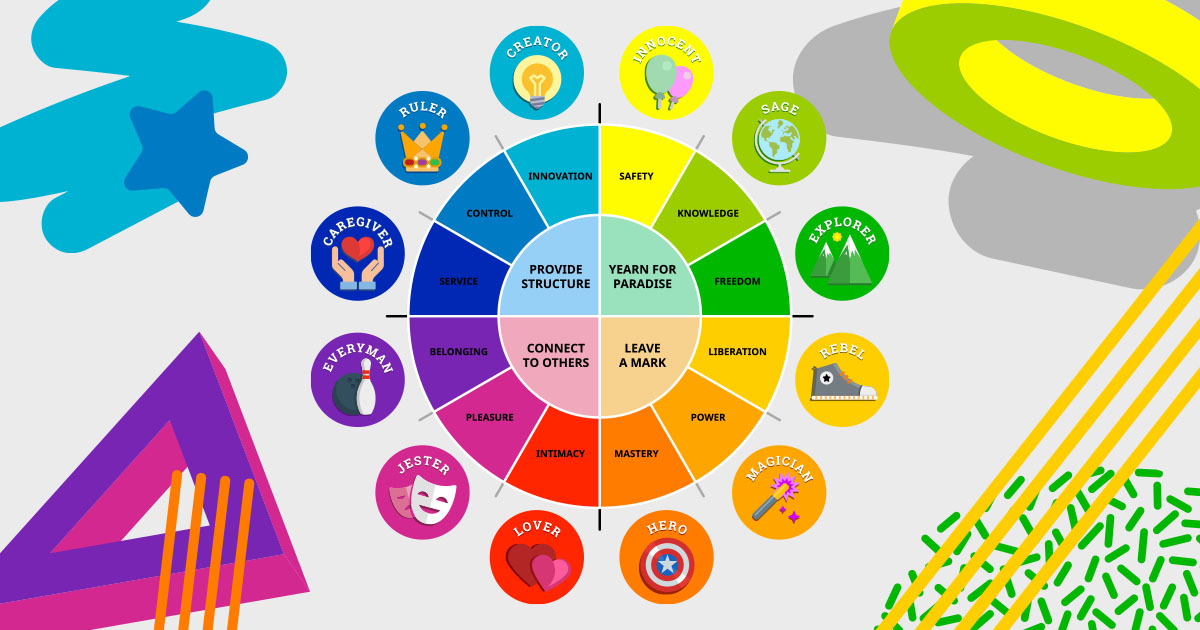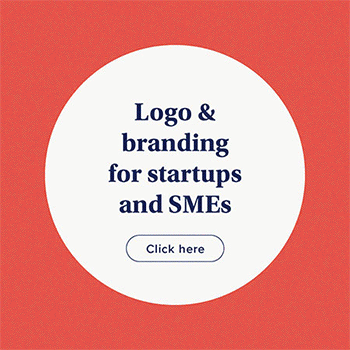An excellent brand is more than just a logo or a website. The best brands create meaningful connections with the people they reach. Through the right combination of visuals, brand personality, and other elements, you can trigger emotional responses in your target customers.
Think about how you feel when you see your favorite brand's logo or hear their name.
To develop a stronger link with customers, brands need to create consistent, engaging messaging and content that maintains a positive impact.
So, how exactly do brands ensure they're making the right impression with everything they do?
It helps to have a solid brand archetype in place.
Your archetype, or brand personality, is a combination of all the crucial characteristics that come together to make your business unique. Learning how to leverage your brand archetypes to drive sales and engagement transforms your company into a memorable entity.
What Are Brand Archetypes?
Brand archetypes are a concept developed by psychoanalyst Carl Jung.
All brands have unique elements that make them special. The personality or identity of your company won't be the same as any other business. The image you create might fall under a specific brand archetype.
Jung says that there are 12 fundamental archetypes that categorize universal personality traits. These traits translate into familiar characters and situations that transcend culture, place, age, and gender.
The 12 unique archetypes in Jung's work make up the Brand Archetype Wheel.
Finding out where you fall on the archetype wheel makes it easier to choose your company's personality. Once you know what kind of character you're trying to create, you can create more consistent, engaging messaging and content.
The 12 Brand Archetypes And Their Examples
Figuring out how to leverage your brand archetype to drive sales means getting to know each brand type first. Here are the 12 archetypes created by Carl Jung.
1. The Magician
The Magician brand archetype is rooted in creativity and imagination. These are the kind of companies that aim to bring your dreams to life.
Disney is the most common example of the Magician brand archetype. Slogans like "The happiest place on earth" highlights the magic at the heart of the business. Coca-Cola could also stand out as a Magician brand archetype, particularly during the holiday season when the "Holidays are Coming" ad lights up the marketing world. Coca-Cola portrays a world where a drink has the power to create positive feelings for citizens worldwide.
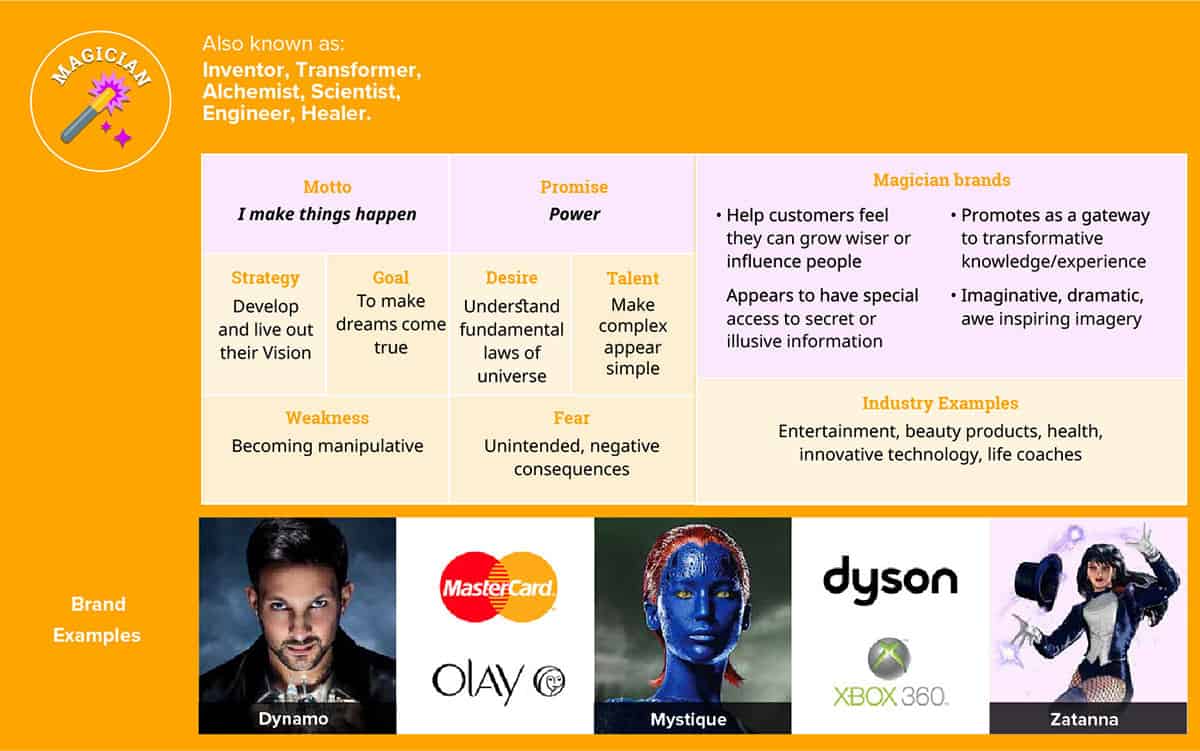
2. The Hero
The hero brand is the company on a mission to make the world a better place. These ventures are about challenging the status quo and making a positive difference. To create consistent engaging messaging and content as a hero brand, you'll need to be bold and ever-improving.
Nike is a fantastic insight into the hero persona, with the Just Do It tagline. Another option is Lush, the beauty company that asks people to love themselves, and strives to make the world a better place by fighting against animal cruelty.
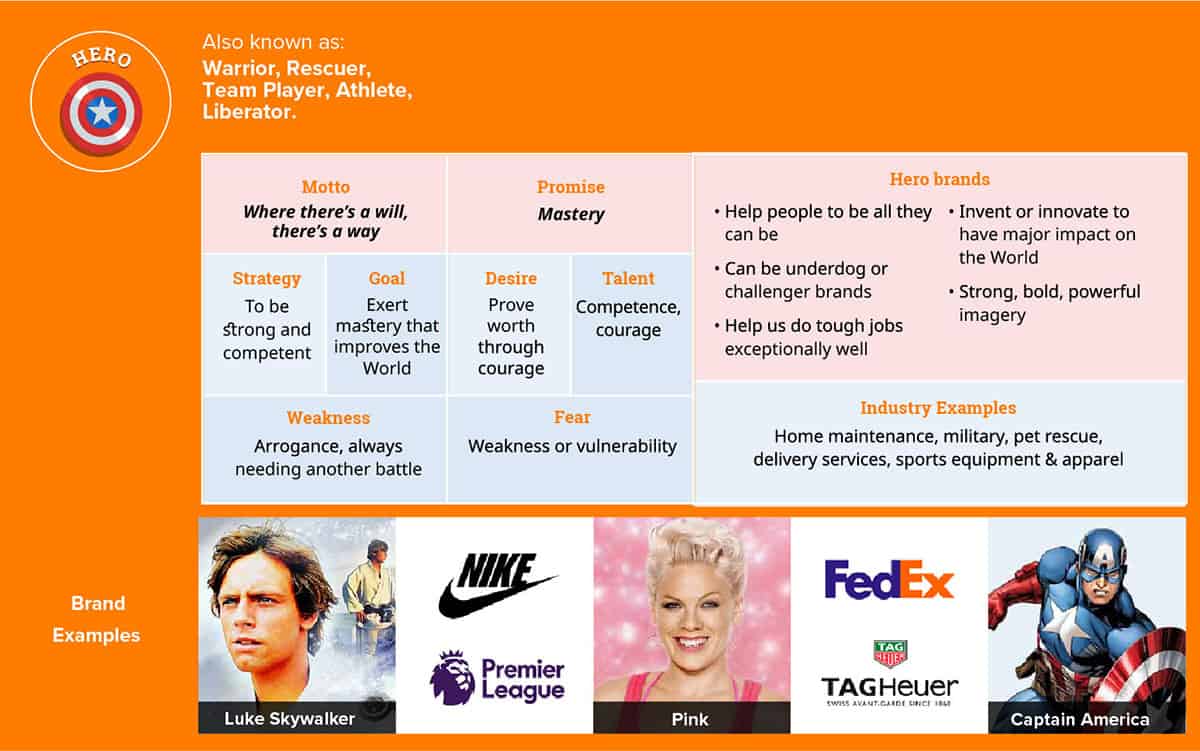
3. The Outlaw
The Outlaw brand archetype is a rebel, known for rejecting the norm and moving away from social conventions. These companies want to liberate customers and give them a new way of life. Brewdog, the craft beer company, is an excellent example of an Outlaw brand.
The company started off as a small brewery with an unapologetic attitude. The company quickly cut through the noise of an over-crowded market to gain global appeal. Now, it's one of the fastest-growing food and drinks companies in the world, with an average growth per year of 167%.
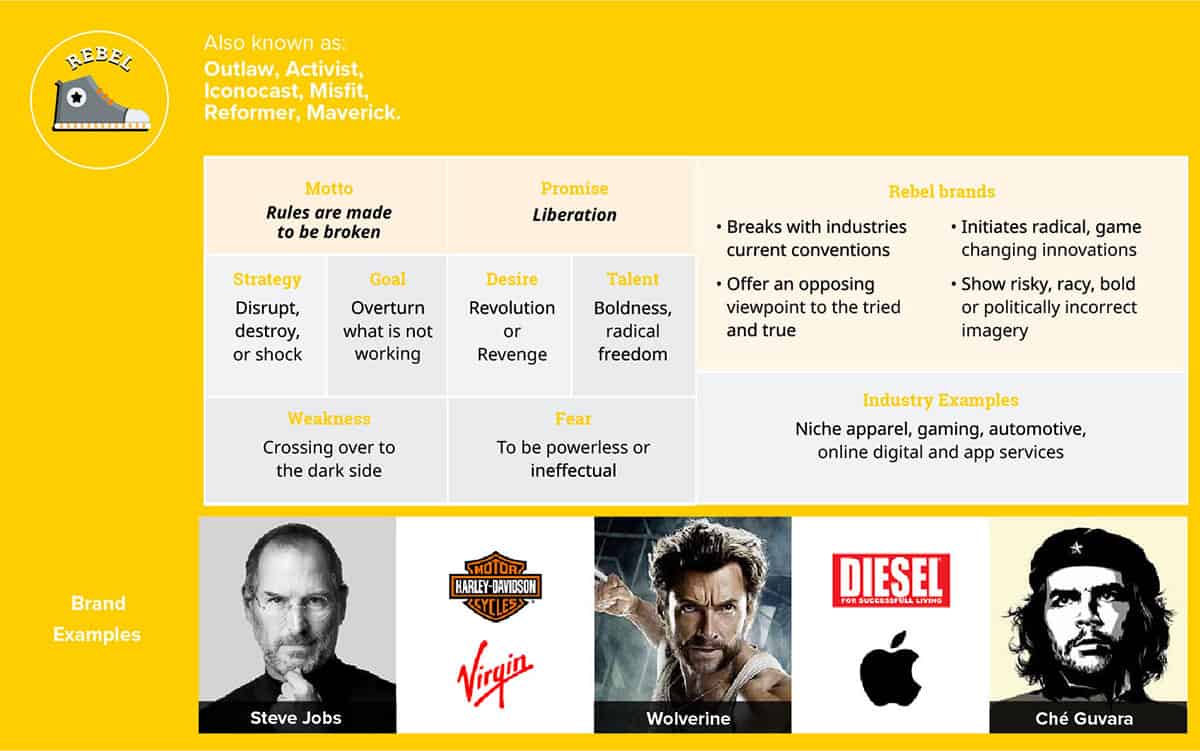
4. The Jester
The jester brand, just like a traditional court jester, aims to entertain its customers. These companies want to make the world laugh and smile. They generally use a lot of humor and silliness in their marketing, and they're not afraid to get informal.
For a great example of the Jester archetype, look at Old Spice or Skittles. Most of the advertisements created by these companies are playful and fun. The "man your man could smell like" ads are deliberately cheeky without being insulting.
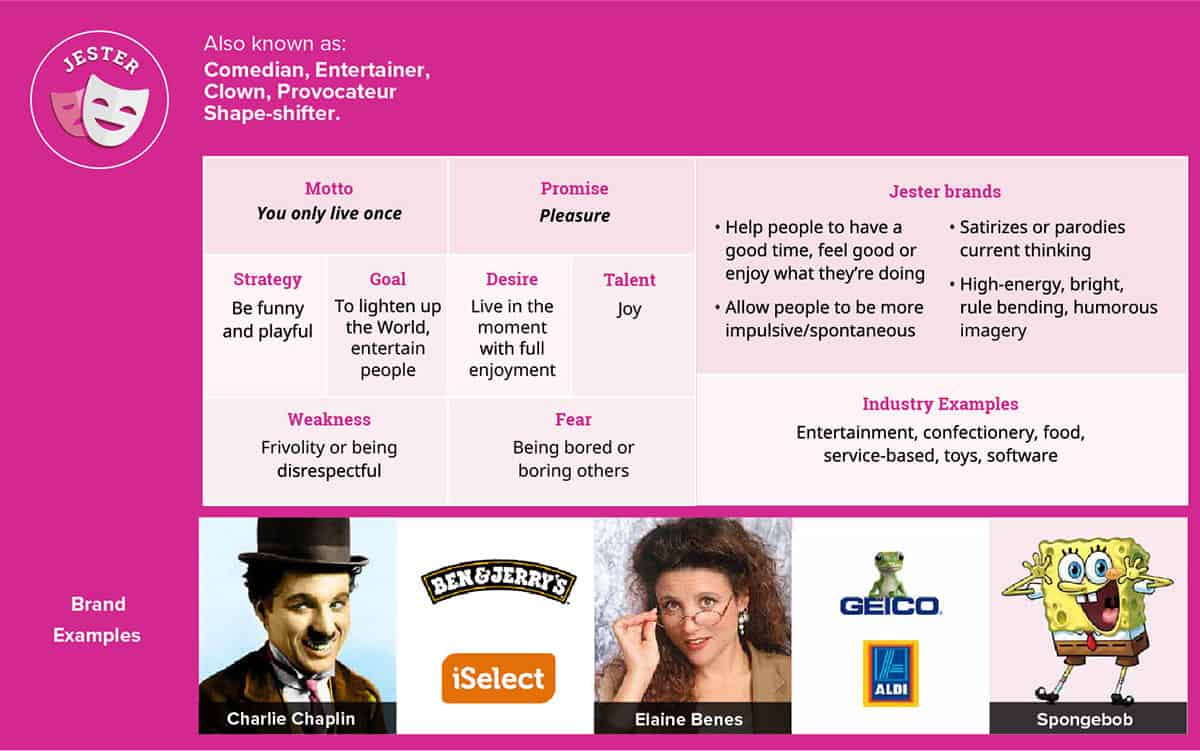
5. The Lover
The Lover brand archetype is all about passion, beauty, and pleasure. The lover companies want to win your mind and heart. They're keen to excite you with moments of indulgence. It's common to find Lover archetype brands in the health and beauty landscape – but not so much in technology.
Victoria's Secret is a great example of the lover archetype – a company that's committed to sensuality and beauty. You could also argue that Dove is a Lover brand because it's all about loving yourself and indulging in the finer things in life.
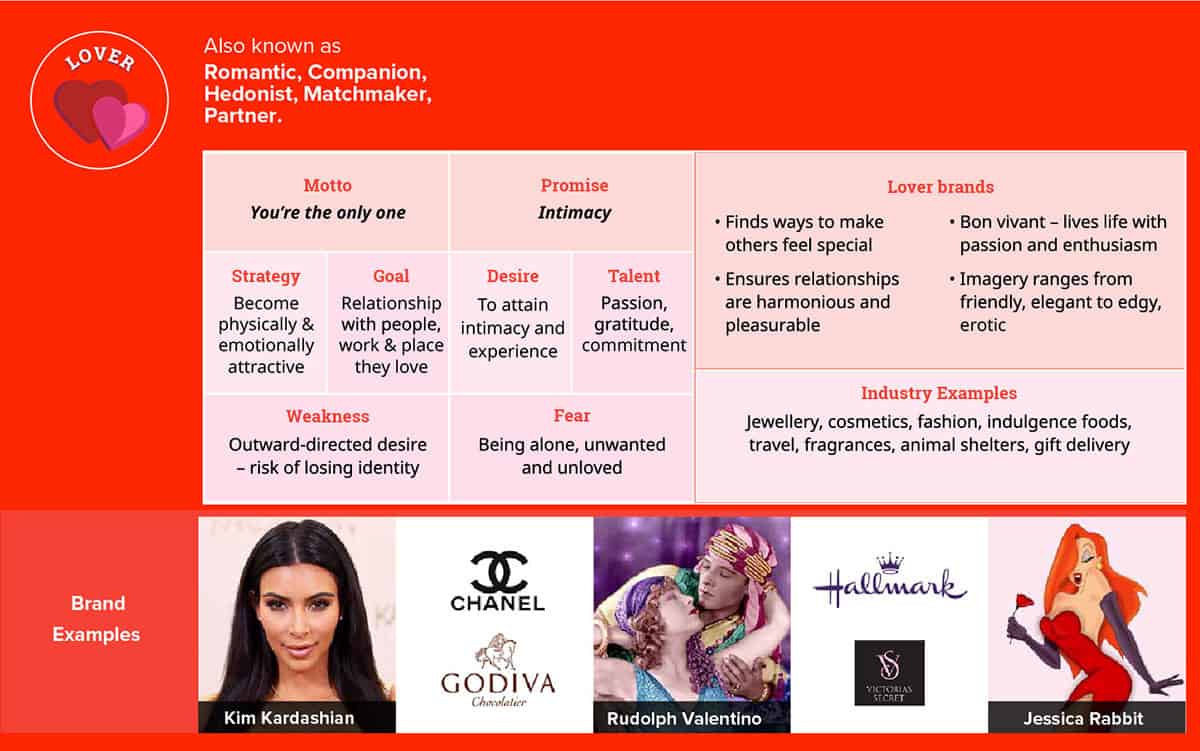
6. The Everyman
When you're learning how to leverage your brand archetype to drive sales, you might decide that you want your company to feel like it's just one of the gang. An everyman brand is your "average joe." The kind of company accessible to everyone, everyman brands are all about staying neutral and maintaining a balanced outlook.
The everyman brand makes everyone feel like they belong. Look at Amazon; the company automatically avoids dangerous topics and bold statements, while focusing on being available for every kind of consumer.
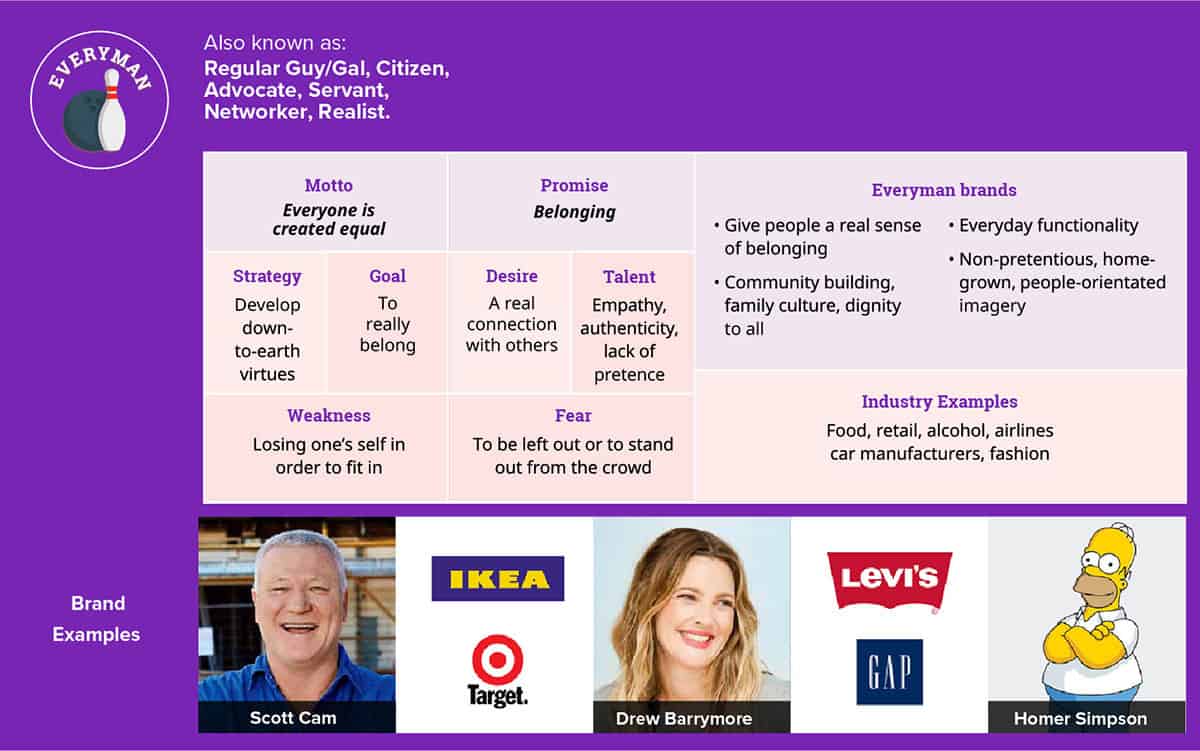
7. The Caregiver
The Caregiver brand archetype is supportive, trustworthy, and engaging. These companies are givers, not takers, and they do everything they can to nurture their customers. There are a lot of great businesses out there that thrive on showing their customers that they care. UNICEF is one of the most recognizable examples of this.
Know around the world for protecting children in danger, UNICEF's tagline "for every child in danger" demonstrates its commitment to step away from self-gain and greed. If your purpose is to look after people, then you're a caregiver brand.
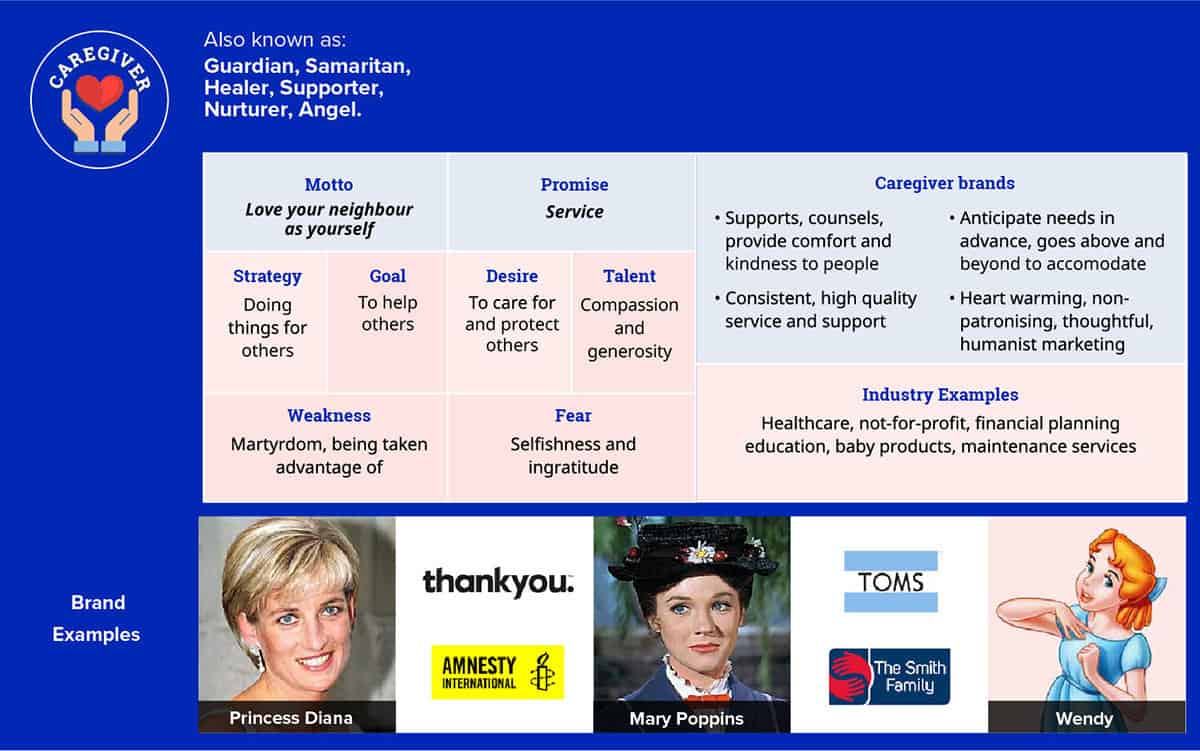
8. The Ruler
The Ruler brand archetype is a company obsessed with gaining power. Everything this business does is designed with luxury, expense, and exclusivity in mind. Ruler brands are the elite entities in their industry – the ones that you often associate with the high-end of the market.
Mercedes Benz is an excellent example of a Ruler archetype, known for exuding luxury and excellent performance. Mercedes cars are classy and refined, and they're only available to those with a certain amount of cash.
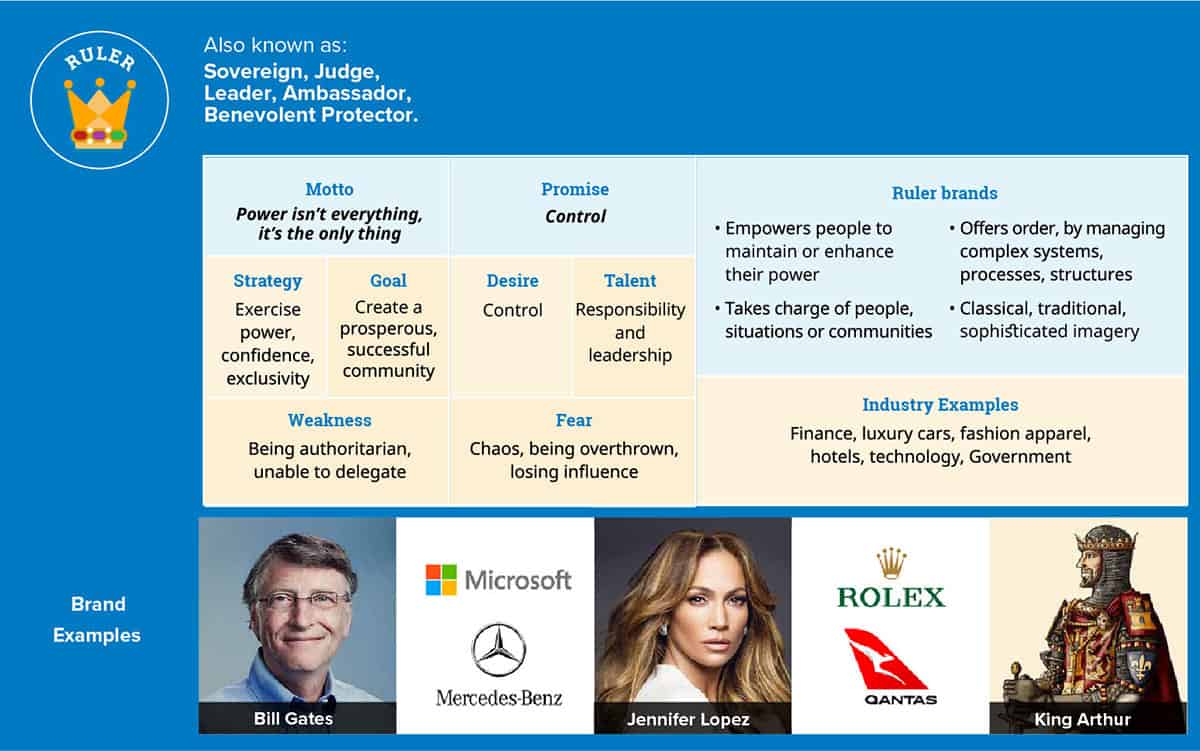
9. The Sage
Think that you've got your head screwed on right? Then the Sage brand archetype could be the one for you. Sage companies are wise, seeking out the truth and looking for new information at all times. The purpose behind a Sage brand is understanding and guidance. You can always count on these organizations to teach you something important about the world.
The BBC is a common example of the Sage archetype. The organization constantly positions itself as a knowledgeable provider of information, committed to delivering the truth. Everything from the content that the BBC produces to the language it uses is based around generating better understanding for its community.
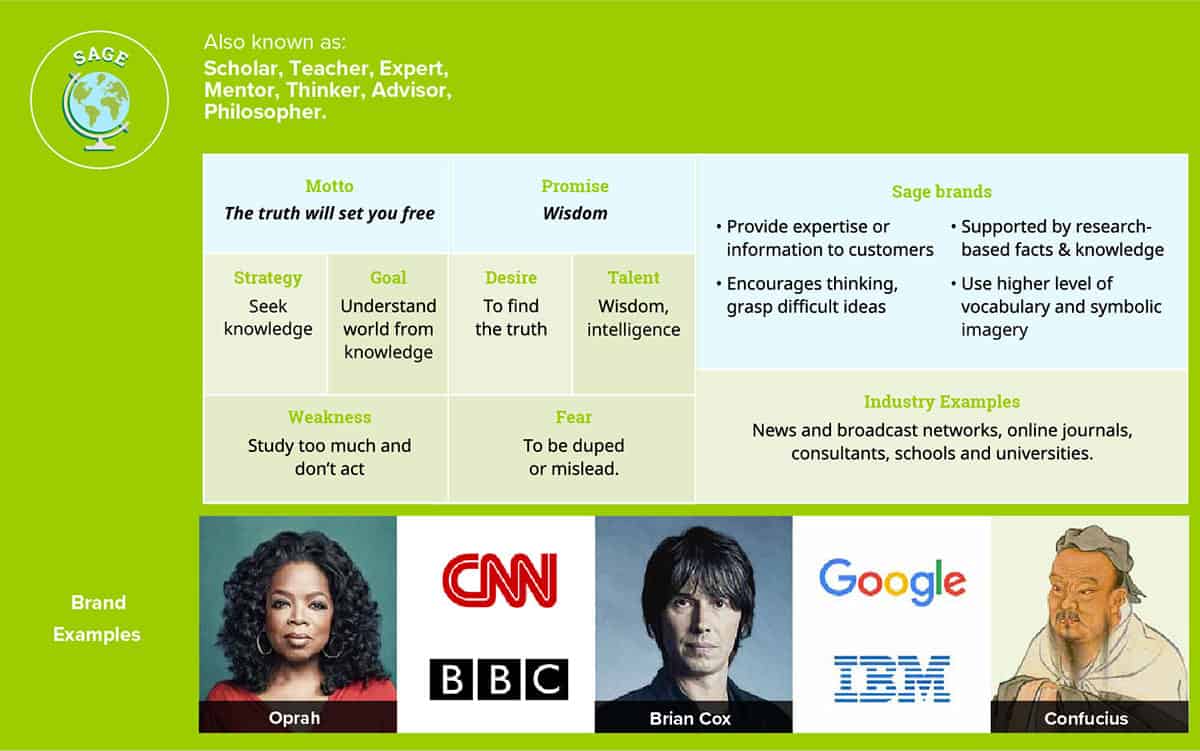
10. The Creator
To create a consistent, engaging messaging and content strategy as a Creator brand, you'll need to focus on your skills as an artist. These companies go further than the Magician archetype, by using innovation to turn dreams into realities.
Trendsetters with their eyes on the future, Creator brands are constantly looking for new ways to achieve their goals. Apple is one of the best-known Creator brands in the world. Known for the phrase "Think different", Apple delivers a new kind of technology that's all about being unique. The Creator archetype is often perfect for companies in the tech space.
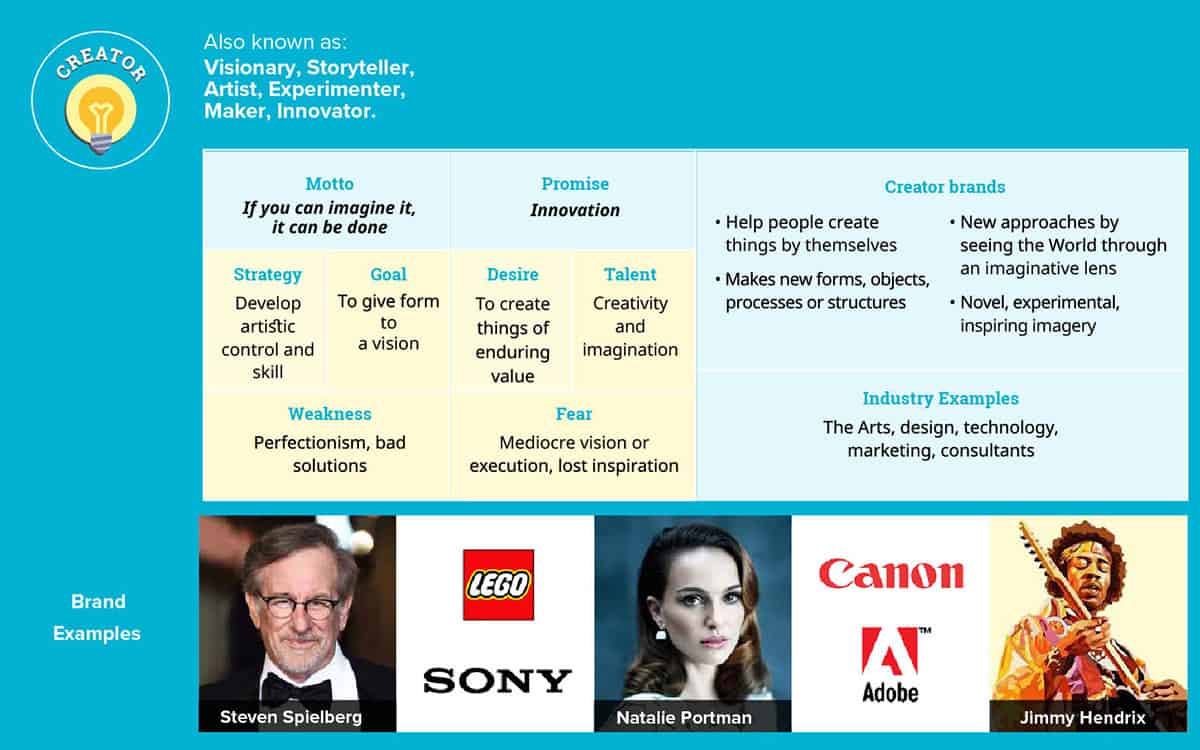
11. The Innocent
As you might guess, the Innocent brand archetype is all about purity and fun. These companies want you to feel comfortable and at ease with their products and services. Innocent brands are playful and optimistic – but they're not Jesters. Many innocent brands use pure means to create happiness, like nostalgia and clean humor.
Innocent Smoothies is the go-to example of the Innocent brand archetype. From the backs of their bottles to their unique Twitter feeds, Innocent is constantly demonstrating a playful and almost childlike personality to customers.
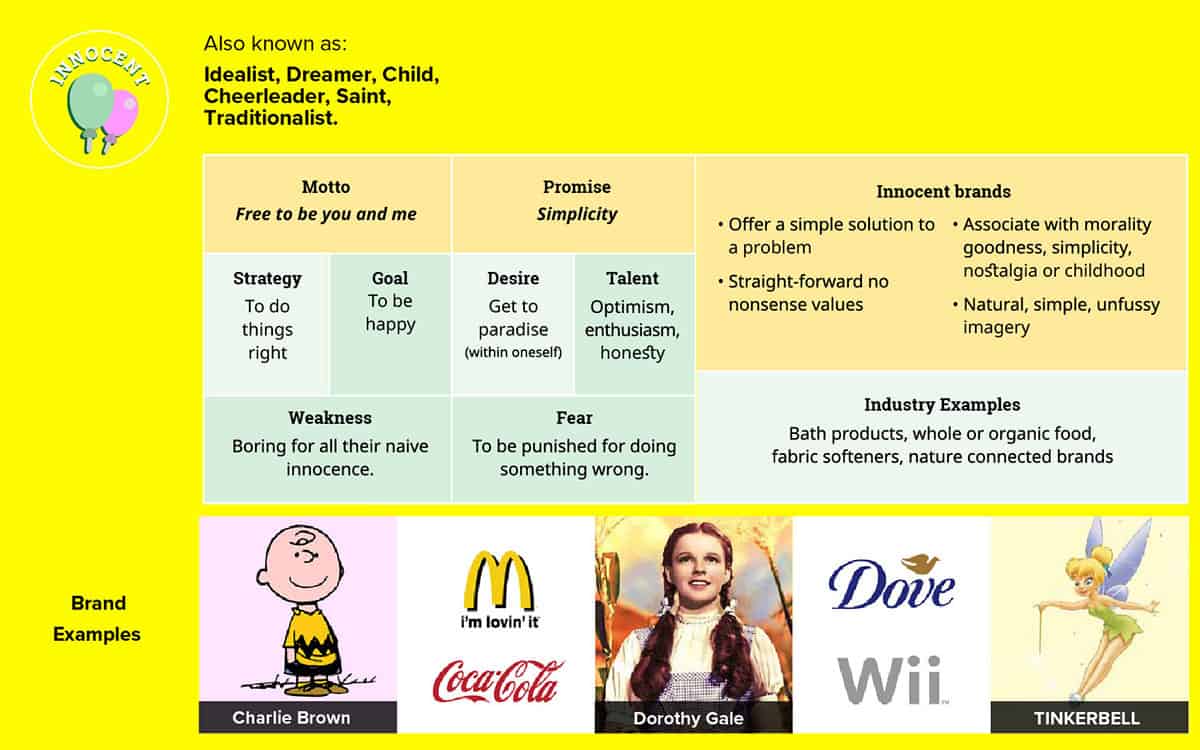
12. The Explorer
The Explorer brand archetype is all about adventure and discovery. Similar to the Creator, these companies want to get to know the unknown, and discover new things. They're always looking for challenges and are often involved with the great outdoors. The key drive behind these companies is freedom.
Explorer brands are common in the Athletic world. Companies like the North Face are constantly encouraging their customers to get out and check out what the world has to offer. If you're looking for tips on how to leverage your brand archetype to drive engagement as an Explorer company, take a leaf out of the North Face's Book.
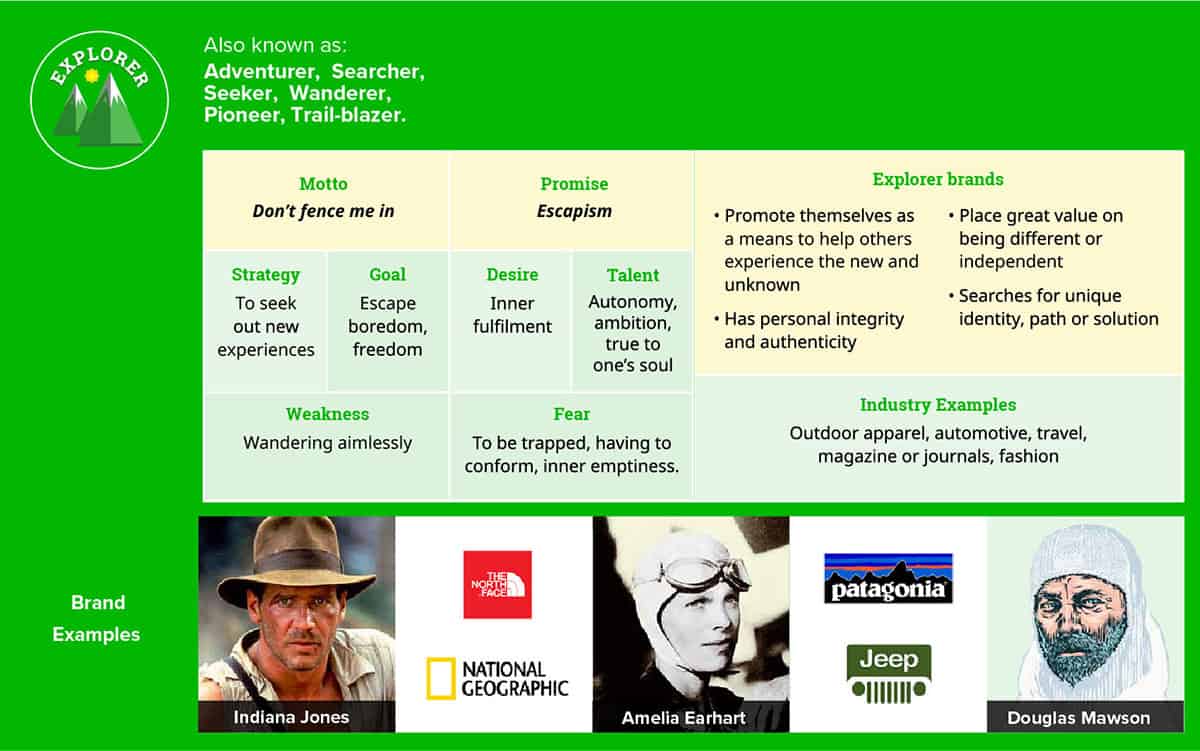
The Importance Of Brand Archetypes
To understand why brand archetypes are so important to your company's identity, it might help to compare to of the better-known businesses in the market today. Google and Apple are both high-performance technology brands with a global reach – but they're very different in their personality
Google is an Innocent company, and a Lover. They want to connect the world through technology, and they're constantly looking at ways to make using tech a more personal and intimate experience. Google believes that technology powers human connection.
Apple, on the other hand, is a Rebel, Explorer, and Creator. This company is all about being unique, discovering new things, and challenging the status quo. Apple wants you to make a statement and stand out from the crowd. It encourages its customers to try new things and challenge what they think of as "ordinary".
None of these archetypes actively turn Google or Apple into a better company, but they do help to determine what kind of customers they attract and what kind of business experiences they can create. The differences between the brand archetypes that Google and Apple use to create consistent, engaging messaging and content is what makes them unique.
How To Leverage Your Brand Archetype To Drive Sales
Ultimately, it's up to you to determine what kind of brand archetype fits with your brand.
Look at your values as a business, why you do what you do, and what you're trying to accomplish. It helps to list some basic descriptive terms that you would use to define your brand. This will help you to figure out what kind of archetype you correlate with. If you'd describe yourself as "forward thinking" and "innovative", you're probably a creator.
Remember, to create consistent, engaging messaging and content, you can't just pick an archetype based on what you want to be. You need to be realistic about who you already are.
There's a chance that you might even fall into a combination of various different archetypes. Once you know which descriptor works for you, here's how you can use your archetype:
- Creator: These brands should be daring and inspiring. Focus on self-expression and motivating your audience to act. Don't be afraid to try new things and avoid anything that might make you look like a copycat.
- Outlaw: Refuse to follow the status quo. Your brand voice and identity needs to have attitude and confidence. Don't just fall in with the pack – make a point to stand out and do things differently. You might not appeal to everyone, but you could create a powerful cult following.
- Hero: Showcase your grit, determination, and dedication in everything you do. Tell your audience how you plan on making the world a better place and get them involved in your quest. Be open about everything you do to build your company.
- Innocent: Make sure that you always come across as innocent and optimistic. You need your customers to trust you and appreciate the happiness that you can bring. Avoid anything in your messaging that would convey negativity, guilt, or similar issues.
- Lover: The lover archetype needs a sympathetic and empathetic brand voice, catering to your audience's desire for intimacy and connection. Appeal to the senses of sound, smell, touch, taste, and sight, and focus on pleasure.
- Sage: Help your audience to understand the world around them, and your place in it, by showcasing practical information. Make yourself a thought leader in your industry, highlight what you know, and make sure that you're always accurate when you're sharing facts.
- Explorer: Convince your customers to explore the world with you and go on as many adventures as possible. Explorer brands are adventurous and brave, they seek discovery wherever they go and promote the beauty of the outdoors and the unknown.
- Everyman: Be honest and down-to-earth. As an Everyman brand, create consistent, engaging messaging and content that makes you seem like you're "part of the team" with your audience. You need to blend in with your consumers, while still having an important purpose. Be humble, and authentic, and make sure that you promote harmony and trust in everything you do.
- Ruler: Ruler brands need to focus on showcasing their leadership and superiority. This could mean creating brand documents that show off how high-quality and luxurious the materials you use are. It could also mean comparing yourself to other brands. Make your customers feel like they're part of an extremely exclusive club. Don't try to appeal to the masses; find your niche and stick with it.
- Jester: Jester brands should always have a playful and fun-loving personality. Make jokes (without being offensive) and promote good experiences with your audience. This is your opportunity to showcase your more childish side from time to time. Always find a way to make your customers smile.
- Caregiver: The main purpose of the caregiver brand archetype is to communicate warmth and protection. Reassure your audience and make sure that you're compassionate in everything you do. Your customers need to feel secure and well looked after whenever they're interacting with you.
- Magician: The Magician archetype uses imaginative and inspiring messaging to make audiences feel like they're going to have their dreams come true. Look at creating transformative experiences for your customers and adding a touch of magic to the things that you sell and the experiences you offer.
Make The Most Of Your Brand Archetype
A brand archetype isn't just another way to characterize your company.
Knowing how to leverage your brand archetype to drive audience engagement, trust, and sales can transform your entire company. Your archetype will help you to keep your marketing and creative teams consistent when they're producing content for your business. It will also ensure that you're less likely to veer off track as your business begins to grow.
What kind of archetype does your business belong to?




